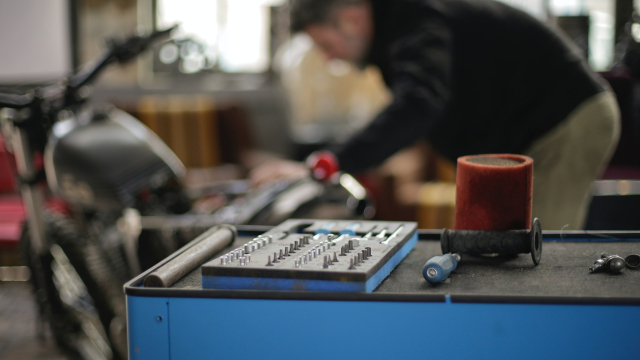Machines in all types of industries use ball screws. From food processing and milling equipment to robots and missiles, these versatile and widely used components make countless processes possible. Any application in which rotary motion needs to be converted into linear motion is likely to use ball screws. That makes these components essential across the globe.
Understanding Ball Screw Damage
Since they’re subjected to constant use and any number of potential hazards, ball screws are prone to damage. When they succumb to damage, express ball screw repair is the key to keeping critical machinery up and running. Certain types of damage are common regardless of the types of ball screws being used or what they’re being used for.
One common problem for ball screws is overloading. Though they’re designed to be strong and resilient, they have their limits. When too much of a load is placed on them or the weight of the load isn’t properly distributed, they can bend, twist, crack, or sustain other types of deformities. If that happens, they may be less effective or even altogether unusable. Overloading can stem from several problems, including improper installation or maintenance, misalignment, and changes in operating conditions.
Corrosion and contamination are also known to cause ball screw damage. Ball screws are often exposed to harsh environments and operating conditions. Dirt, dust, metal shavings, and other contaminants can work their way into ball screw assemblies. When they do, they can wear away at those components and weaken them. Corrosive agents like chemicals may detract from a ball screw’s structural integrity as well. Both those issues can cause a ball screw to fail and even lead to damage to other components.
Normal wear and tear can affect ball screws over time as well. This type of damage can lead to decreased precision, increased backlash, and other serious problems. As such, it can hamper production and increase the likelihood of unexpected downtime. It can drive up maintenance and repair costs as well if it’s not promptly addressed.
Why You Need to Address Damage as Quickly As Possible
Fast, effective ball screw repairs are crucial for many reasons. For one, responding to ball screw damage as quickly as possible can save a great deal of money over the long term. If left to its own devices, a damaged ball screw can lead to more widespread damage. It can eventually affect an entire machine. That’ll bring about even more extensive and expensive repair needs.
Prompt repairs will reduce downtime as well. If damage isn’t handled quickly, it may bring production to a halt. At the very least, it’ll detract from a machine’s precision, which can slow production and result in wasted time and materials. All those issues can be avoided by addressing ball screw damage early on.
Fostering Production with Prompt Ball Screw Repairs
Ball screws work quietly in the background of numerous industries. They require a certain amount of maintenance, but they’re generally strong and reliable. When they sustain damage, though, they can cause major problems. Quickly addressing damage is the key to minimizing downtime, unnecessary repair costs, reduced production, and other issues.

Production and Minimizing Downtime
Machines in all types of industries use ball screws. From food processing and milling equipment to robots and missiles, these versatile and widely used components make countless processes possible. Any application in which rotary motion needs to be converted into linear motion is likely to use ball screws. That makes these components essential across the globe.
Understanding Ball Screw Damage
Since they’re subjected to constant use and any number of potential hazards, ball screws are prone to damage. When they succumb to damage, express ball screw repair is the key to keeping critical machinery up and running. Certain types of damage are common regardless of the types of ball screws being used or what they’re being used for.
One common problem for ball screws is overloading. Though they’re designed to be strong and resilient, they have their limits. When too much of a load is placed on them or the weight of the load isn’t properly distributed, they can bend, twist, crack, or sustain other types of deformities. If that happens, they may be less effective or even altogether unusable. Overloading can stem from several problems, including improper installation or maintenance, misalignment, and changes in operating conditions.
Corrosion and contamination are also known to cause ball screw damage. Ball screws are often exposed to harsh environments and operating conditions. Dirt, dust, metal shavings, and other contaminants can work their way into ball screw assemblies. When they do, they can wear away at those components and weaken them. Corrosive agents like chemicals may detract from a ball screw’s structural integrity as well. Both those issues can cause a ball screw to fail and even lead to damage to other components.
Normal wear and tear can affect ball screws over time as well. This type of damage can lead to decreased precision, increased backlash, and other serious problems. As such, it can hamper production and increase the likelihood of unexpected downtime. It can drive up maintenance and repair costs as well if it’s not promptly addressed.
Why You Need to Address Damage as Quickly As Possible
Fast, effective ball screw repairs are crucial for many reasons. For one, responding to ball screw damage as quickly as possible can save a great deal of money over the long term. If left to its own devices, a damaged ball screw can lead to more widespread damage. It can eventually affect an entire machine. That’ll bring about even more extensive and expensive repair needs.
Prompt repairs will reduce downtime as well. If damage isn’t handled quickly, it may bring production to a halt. At the very least, it’ll detract from a machine’s precision, which can slow production and result in wasted time and materials. All those issues can be avoided by addressing ball screw damage early on.
Fostering Production with Prompt Ball Screw Repairs
Ball screws work quietly in the background of numerous industries. They require a certain amount of maintenance, but they’re generally strong and reliable. When they sustain damage, though, they can cause major problems. Quickly addressing damage is the key to minimizing downtime, unnecessary repair costs, reduced production, and other issues.



